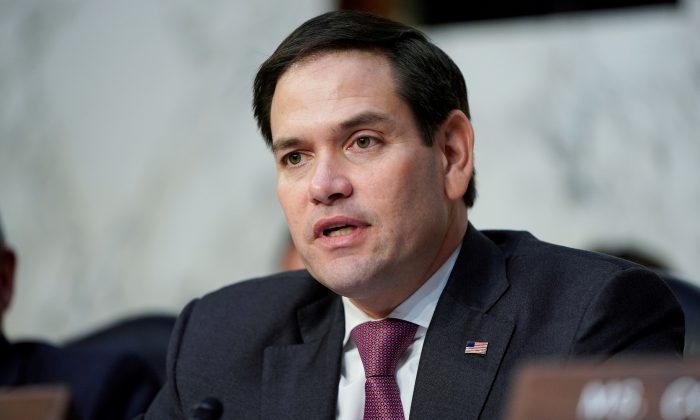Kevin McCarthy Says House Democrat Told Him They Want to Switch Parties
WASHINGTON—Sen. Marco Rubio (R-Fla.) is taking action in the wake of the Thrift Savings Board’s (TSB) refusal to reverse its decision earlier this year to invest billions of dollars saved by federal employees and members of the U.S. military in Chinese firms connected to Beijing’s military research and development.
“It’s unconscionable that the Federal Retirement Thrift Investment Board did not reverse their short-sighted—and foolish—decision to transfer the retirement savings of our service members and federal employees to the Chinese Communist Party,” Rubio told The Epoch Times on Nov. 14.
“The TSB’s refusal to act in the best interests of the United States will not go without consequence. I urge my colleagues to quickly pass our bipartisan and bicameral TSP Act to ensure that the board cannot force U.S. service members and federal employees to unwittingly invest in AVIC’s AviChina Industry & Technology, Hikvision, ZTE, or other Chinese companies that are undermining American and allied national security interests,” he added.
“There’s no excuse for this decision,” said Sen. Jeanne Shaheen (D-N.H.), who joined with Rubio on legislation to stop the TSB action.
“This should have been an easy call to reverse course, yet the board has decided to double down on this dangerous proposal. It’s reckless to prop up companies that threaten U.S. interests and values, and it’s particularly egregious that this is being done with the retirement savings of federal workers, including our military and civilian workforce,” Shaheen said in a Nov. 13 statement.
The TSB met on Oct. 28 and opted to continue as planned as a result of its decision to move its International Fund Index to the MSCI All Country World ex-U.S. Investable Market Index.
That index includes multiple Chinese companies currently subject to multiple U.S. sanctions and export bans. As much $50 billion could be headed to China as a result of the TSB decision.
Rubio and Shaheen are co-sponsors of the Taxpayers and Savers Protection Act of 2019, which would bar the TSB from investing in Chinese firms.
Other co-sponsors include Sens. Kirsten Gillibrand (D-N.Y.), Mike Braun (R-Ind.), Mitt Romney (R-Utah), Rick Scott (R-Fla.), and Josh Hawley (R-Mo.).
The TSB acted despite an Oct. 22 letter from Rubio, Shaheen, and the other co-sponsors warning about the close relationship between China’s People’s Liberation Army and many of the major Chinese firms that would benefit from the U.S. investments.
Putting TSB funds with the new index would directly benefit “military contractors to the People’s Liberation Army (PLA), such as the Aviation Industry Corporation of China (AVIC) and China Unicom, which supply military aircraft and telecommunications support to militarized artificial islands in the South China Sea,” the senators told the TSB in the letter.
“It also includes firms like Hangzhou Hikvision Digital Technology, which was recently added to the U.S. Department of Commerce’s Entity List and produces surveillance equipment the Chinese government currently uses to oppress and detain approximately one million Uighur Muslims and other religious minorities.”
Also among the firms cited by the senators was ZTE Corp., “which was fined last year for violating U.S. sanctions law for business activity with Iran and North Korea, and which Congress has enacted a law to prohibit the U.S. federal government from procuring.”
“Additionally, the basic financial hazards of investment in firms listed on Chinese exchanges are well-documented. A recent accounting scandal involving one of China’s biggest accounting firms, Ruihua Certified Public Accountants, highlights the extent of the irregularities in the financial markets to which federal employees may soon be exposed.”
A spokesman for Rubio told The Epoch Times that the Florida Republican is encouraging Senate Homeland Security and Government Affairs Committee Chairman Ron Johnson (R-Wis.) to act quickly on the proposed TSP Act.
Rubio is among the Senate’s most active advocates of strong actions against Chinese aggression and abuses. On Nov. 6, for example, Rubio asked Secretary of Defense Mark Esper what the Department of Defense is doing to remove an estimated 2,700 communications devices produced by Chinese firms and in use by federal installations, despite the fact the devices are known to provide intelligence data to China.
“The Department of Defense must act quickly to identify and remove this equipment, as every day that passes only provides our adversaries additional time to infiltrate and exploit our national security networks as well as the ability to monitor U.S. military activities that may be of interest,” Rubio told Esper.
Contact Mark Tapscott at [email protected]
This article is from the Internet:Federal Thrift Savings Board Insists on Investing in China Stock
